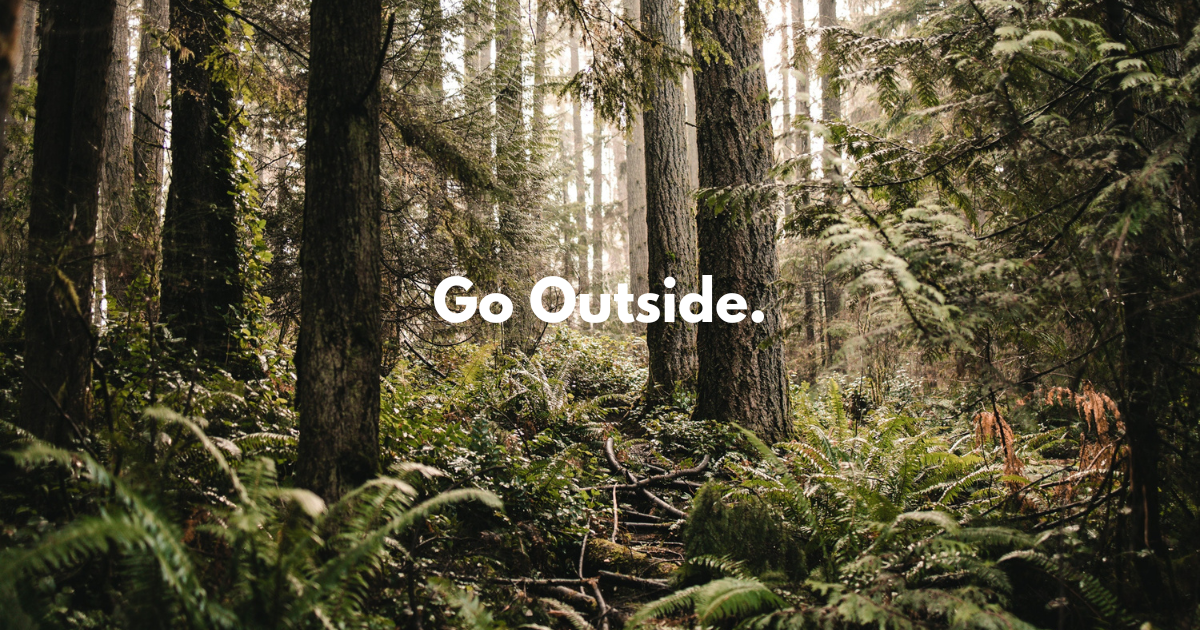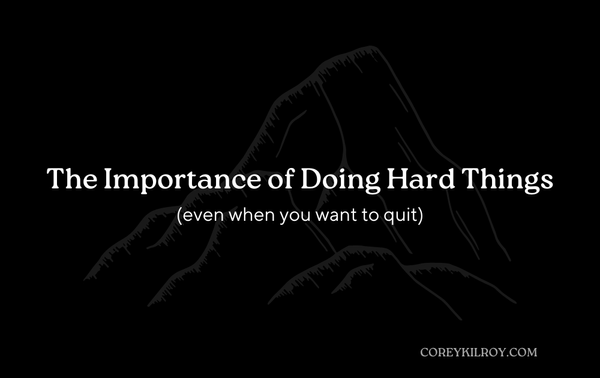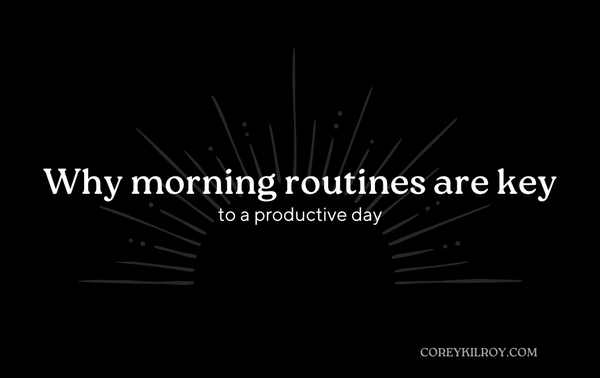We’re Stuck in a Concrete Zoo.
Why you should be getting out in nature more.

"For a time, I rest in the grace of the world, and am free."Wendell Berry
You read the title right, we’re living in a concrete “cage”, practically living like zoo animals.
Yet, none of us even realize it.
If you live in the city, you may constantly notice new buildings popping up.
The concrete jungles that society’s built over the past century have permitted millions of individuals to live in close proximity to one another – and modern economies to progress.
But what have we given up as human beings by living away from forest environments, the same in which humans first evolved in?
Urban environments have caused a plethora of negative effects to not only the physical health of humans but their emotional wellbeing as well.
People are developing “Nature Deficit Disorder” at a very young age, specifically children.
Gone are the days of playing outside as a child, riding bikes around the neighborhood, hiding inside bushes when playing “manhunt”.
Every child nowadays is an “iPad kid”, whose only source of entertainment is behind an LED screen.
So what is “Nature Deficit Disorder”?
This “disorder” isn’t a medical diagnosis but a term describing real consequences of too little exposure to nature in a child’s life.
Modern kids spend less and less time outside, and this is causing a physical and emotional toll on their health – specifically, the use of their senses diminishing, attention decreasing, increased weight gain, plus an increased rate of physical and emotional stress.

This can be said for adults as well.
Being stuck in the office, hospital — or wherever you may work — being stuck inside is causing detrimental health problems to people around the world.
Increased rates of depression and anxiety, obesity, lack of focus… did I mention obesity?
Sitting around all day, trapped inside the concrete walls society created, is negatively impacting physical and mental well-being.
A study conducted by Dr. Frances Kuo stated that:
“Humans living in landscapes that lack trees or other natural features undergo patterns of social, psychological and physical breakdown that are strikingly similar to those observed in other animals that have been deprived of their natural habitat”
Pretty scary to think about, but it's completely true. We’re starting to live like zoo animals.
So Why Should You Care?
There are hundreds of articles and podcasts out there that go over the various impacts nature has on human health and behavior.
Because of this, I’m only going to narrow these into
4 main ways nature impacts our well-being:
1. Nature Heals
Being in nature, or even merely viewing scenes of nature, reduces anger, fear, stress, and increases pleasant feelings.
That’s why your doctor’s office most likely has landscape paintings and pictures hanging on the walls.
Exposure to nature not only makes you feel better emotionally, it contributes to your physical well-being, reducing blood pressure, heart rate, muscle tension, and the production of stress hormones.
Even a simple plant in the room contributes to this phenomenon.
2. Nature Soothes
In addition to nature’s healing properties, it also helps us cope with pain.
Humans are genetically programmed to find plants, trees, water, and other natural elements when in need of comfort.

This is perfectly demonstrated in a study of patients who underwent gallbladder surgery – half of which had a view of trees and the other half only having a view of a wall.
According to Robert Ulrich – the physician conducting the study – the patients with the view of trees tolerated pain better, appeared to have fewer negative outcomes, and spent less time in the hospital.
Pretty cool, huh?
3. Nature Connects
Previously I mentioned a study by Dr. Kuo that suggests that humans are currently living in a society that’s mimicking zoo animals being deprived of their natural habitat.
This study also suggests that residents in Chicago public housing who had trees and green space around their building reported an increase in human connection with others, having stronger feelings of unity with neighbors, and having stronger feelings of belonging compared to tenants in buildings without trees.
Violence and aggression are highest in urban settings that lack trees and grass, and this is becoming increasingly prevalent in society today.
4. Nature Restores
Overall, nature has a tremendously positive effect on general well-being.
Further studies conducted by Ulrich, Kim, and Cervinka suggest that time in nature or scenes of nature are associated with positive mood and psychological well-being.
There’s a reason doing work or reading outside is so attractive to us, humans find nature inherently interesting, so we can naturally focus on what we’re experiencing while surrounded by nature.
Research by Andrea Taylor even found that children with ADHD increased their attention span after spending time in nature.
How Can You Spend More Time in Nature?
Immersing in nature should be on everyone’s daily list of activities.
The negative effects alone should drive you to prioritize being out in nature more often.
But I get it, we all lead busy lives, however…
Here are 5 simple ways to expose yourself to nature:
1. Grounding
Grounding, also called earthing, is a therapeutic technique that involves doing activities that “ground” or electrically reconnect you to the earth.
The Earth contains a field of negatively charged free electrons.
Yes, we’re getting scientific over here
Electrical conductivity exists throughout this matrix, and grounding connects your body to this organic source of energy.
Once connected, earthing neutralizes free electrons in the body.
In a nutshell, everything that’s made of atoms (so…everything) has a net charge that’s either positive, negative, or neutral.
Your body picks up those free ions from the earth's surface that act as antioxidants in your system, which helps neutralize damaging excess free radicals that can lead to inflammation and disease in the body.
A notable study also found that grounding appears to improve sleep, reduce inflammation, normalize the day–night cortisol rhythm, reduce pain, reduce stress, shift the autonomic nervous system from sympathetic toward parasympathetic activation, increase heart rate variability, speed wound healing, and reduce blood viscosity.
It was found that grounding showed a significant change in repair and inflammatory blood markers – potentially speeding up recovery and reducing soreness associated with muscle damage.
The image on the right is the thermal radiation after Grounding.

These thermal images, of a patient with pain in both knees, were taken a half-hour apart − before (left) & after Grounding (right).
Tissue damage generates heat, represented by the hot colors on the left.
The difference shows a clear and rapid resolution of inflammation.
Other noticeable benefits of grounding have resulted in boosts of mental clarity and positive spirits.
See science is pretty cool, right?
How can you start grounding? The easiest way is through direct contact with the Earth.
- Walking Barefoot
- Lying on the ground
- Swimming in natural pools of water
- Using Grounding equipment (grounding mats, sheets, socks, patches, etc.)
2. Seek Sunlight as Soon as You Wake Up
You may be familiar with one of nature’s oldest and most important features… the Sun!
Sunlight is THE most important aspect of survival for all living things on Earth.
Yes, it produces heat and sunlight for food sources to grow and provide for us humans.
But, getting exposure to sunlight in the morning can also help you sleep at night because it helps reset your body's inner "sleep clock."
Light is an important cue for your body’s sleep cycle. The light you are exposed to during the day helps your body figure out when it’s time to go to bed (and when it’s time to wake up).
THE Andrew Huberman said it best:
Viewing sunlight in the morning causes ~50% increase in circulating cortisol, epinephrine and dopamine. These leverage healthy increases in energy, immune system function and mood.
— Andrew D. Huberman, Ph.D. (@hubermanlab) August 3, 2022
Full episode of Huberman Lab Podcast on tools for immune-neural health and mood coming soon.
Your body senses when it's daytime and when it's nighttime by being exposed to light. If you didn't get cues from light, your body would run on a pattern that is set by your genetics called tau.
The problem with tau is that it does not always exactly match the 24-hour day. Over time, day-to-day differences add up.
Not only this, but we’ve all dealt with seasonal depression.
It’s not just in your head, there’s a reason those long Winter months tend to bring us down… and why?
Because there’s less sunlight. Sunshine boosts your body’s level of serotonin, which is a chemical that improves your mood and helps you stay calm and focused. Increased exposure to natural light may help ease the symptoms of seasonal affective disorder.
3. Go For Walks During Lunch
We all lead busy lives, and many of us are involved in a job that prevents us from having a peaceful lunch.
And for that, I tip my hat off to you.
However, for those of you with a little more freedom, I’d suggest spending a fraction of your lunchtime going outside for a walk.
This will allow you to take advantage of some sunlight (as explained above), as well as being able to clear your head of any anxious or negative thoughts.
A deep breath of fresh air always does us some good too, doesn’t it?
4. Do Work / Read Outside
It’s no coincidence that you like to bring a good book to the beach.
Doing work or reading a book outside is extremely attractive to us when the weather permits.
Just like we learned earlier, nature has a way of soothing us, which is why it’s so attractive to us when overwhelmed with work or life.
Even in college, when the weather was warm and sunny, you’d see people all around campus studying and getting work done while soaking up the sun and getting some fresh air.
This is a great way to boost productivity and increase your time out in the good outdoors.

5. Go For a Hike
No, I’m not telling you to eff off…
If you’ve never done it, you need to experience a good hike outdoors.
There’s nothing like making a long trek up a mountain, suffering from sore legs and cardiovascular distress, all to end up at the most beautiful view you’ve ever seen at the top of that mountain.
These hikes combine all benefits I’ve mentioned previously.
Increased sunlight, fresh air, you can even go barefoot for a few minutes and work on your Grounding.
The reward at the end of any physical activity in nature is very fulfilling and you experience all the benefits of being outdoors along with it.
BONUS:
Ecotherapy.
Ecotherapy stems from the belief that people are part of the web of life and that our psyches are not isolated or separate from our environment.
It is the practice of being in nature to boost growth and healing, especially mental health.
This terminology sums up this entire essay, relaying the fact that human beings need to be out in nature, not only for physical benefits but for our mental health and sanity as well.
The beneficial effects of nature result not only from what people see but from what they experience through other senses as well. For example, in one recent study, participants recovered more quickly from psychological stress when they were exposed to nature sounds (from a fountain and tweeting birds) than when they were exposed to road traffic noise.
If you’re struggling with any form of mental stress, perhaps spending more time outside with benefit you.
In the end…
Getting out in nature should be at the top of everyone’s list of priorities.
Humans first evolved in the wilderness and only in recent years have we drawn away from this natural instinct.
Because of this “entrapment” in the concrete jungle around us, mental and physical well-being is paying the price.
At the very least, buy a couple of plants and put them in your home and office.
For me, okay?
TL;DR
- Humans are experiencing “zoo-like” symptoms of entrapment due to the lack of outdoor exposure.
- There are a vast amount of benefits to being outdoors.
- Whether you’re going on a hike barefoot or buying a plant for your office, bringing nature into your life is of utmost importance to your physical and mental well-being.
🙇🏻♂️🌱 Until Next Time, C.



